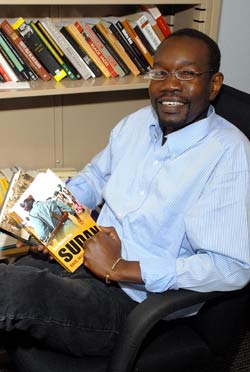| 02-27-2018, 04:32 PM |
Amir H. Idris
 Amir H. Idris Amir H. Idris
Registered: 08-31-2014
Total Posts: 11
|
|
 South Sudan Needs Its Nelson Mandela to Rescue the Country From the Sinkhole By Amir Idris South Sudan Needs Its Nelson Mandela to Rescue the Country From the Sinkhole By Amir Idris
|
04:32 PM February, 27 2018 Sudanese Online
Amir H. Idris-
My Library
Short URL
https://www.newsweek.co.uk/south-sudan-needs-its-nelson-mandela-rescue-country-sinkhole-535268https://www.newsweek.co.uk/south-sudan-needs-its-nelson-mand...ntry-sinkhole-535268
A United Nations Human Rights Commission report condemned the level of violence in war-torn South Sudan, citing horrifying atrocities including slitting of throats, gouging out of eyes, castrating and mutilating men, gang-raping men and women on a massive scale, forcing children to watch their mothers being raped and killed, and burning villages.
The report, released on 23 February 2018, says that up to 40 military officers and officials may have committed war crimes and crimes against humanity. It confirms a 2014 African Union report, which documented similar atrocities committed by warring parties in South Sudan.
The documented appalling atrocities not only numb the conscience of humanity, but also exemplify the sickening state of affairs in South Sudan.
The country is a perfect example of a failed state run by a degenerated species of political elites who care less about the lives of their own people. In their quest for power and privilege, they are willing to walk on the mutilated bodies of their victims.
The highest ideals of humanity, such as the sanctity of lives and respect for dead bodies have no place in the mind of political and military elites who become addicted to power in South Sudan.
Since the country gained its political independence in 2011, violence has been elevated to the status of an official policy of the state, and has been licensed to demean, humiliate and physically uproot or exterminate those who are perceived as enemies of the state.
No doubt, the massive atrocities committed by the warring parties make it inconceivable to imagine a sustainable peace in South Sudan without justice and accountability. The fourвҖ“year civil war has killed thousands and forced more than four million people to flee their homes вҖ”one third of the country's population.
The repeated efforts by the Inter-Governmental Authority on Development (IGAD), an East African body, to end the war and restore peace in South Sudan have failed to deliver a solution due to lack of strategy and leadership from the member states.
The recent IGAD-sponsored High Level Revitalization Forum (HLRF) held in Addis Ababa, Ethiopia, from February 2-16, ended without a peace deal. The government and the opposition could not reach an agreement on three contentious issues: Causes of the conflict, governance, and security arrangements.
The government delegation at the recent HLRF refused to sign the Declaration of Principles (Dope) simply because the document includes an accountability clause.
By opposing the inclusion of an accountability clause, the government seems to consciously or unconsciously admit its guilt and fear the prosecution of its officials.
Ironically, the IGAD too seems to subscribe to the same erroneous position advanced by the government of South Sudan. It pressured opposition groups, who signed the Dope, to continue with the peace talks without putting pressure on the government delegation to attach its signature to the Dope.
The IGAD position of prioritizing peace over justice exemplifies the decaying state of politics in the East African region. After all, Sudan, Ethiopia, Uganda and Kenya have dismaying records on human rights. The recent violent suppression of opposition voices in these countries confirms the fallacy of the discredited slogan of "African solutions for African problems", which values peace over accountability.
Although the idea of prioritizing peace and reconciliation is lofty and admirable, it does not rescue South Sudan from the sinkhole. After all, South Sudan has no Nelson Mandela or Mother Theresa now to value the importance of adhering to the highest ideals of humanity.
Unlike South Africa, South Sudan's political elites lack an inspiring vision, a commitment to democracy, and a readiness to compromise.
Hence, South Sudan has no choice except to come to terms with its violent past and hold those who committed those atrocities accountable. The success of any future peace agreement depends entirely on linking sustainable peace to justice and accountability.
Such a link will entail two immediate measures to be taken by the regional actors and the international community. First, the IGAD and the international community must insist on the government to sign the declaration of principles before the reconvening of the next round of the peace talks. Second, the A.U. should cease in dragging its feet and set up the hybrid court as stipulated in the 2015 peace agreement.
If only the regional actors and the international community took these two steps immediately, the culture of impunity has a better chance of coming to an end and a path for a sustainable peace in South Sudan could then be forged.
https://www.newsweek.co.uk/south-sudan-needs-its-nelson-mandela-rescue-country-sinkhole-535268https://www.newsweek.co.uk/south-sudan-needs-its-nelson-mand...ntry-sinkhole-535268
Amir Idris is a South Sudanese academic and professor and chair of Department of African and African American Studies at Fordham University, New York City.
|
|
   
|

|

|

|
|
|